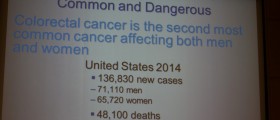
Colorectal cancer is one of the leading causes of cancer deaths in the United States. It occurs in the lining of the large intestine which is also referred to as the colon. Tumors may also be present in the rectum, which is the lining of the very last part of the colon. If a colorectal cancer gets detected early enough it can be treated.
How It Starts?
It usually starts in the form of polyps which are actually bumps on the surface of the colon. Polyps may also occur without being related to the development of colorectal cancer.
Types of Polyps
There are two different types of polyps which may occur in the large intestine. The first type is called adenomas and they are benign polyps which eventually develop into colon cancer if they do not get treated on time. The other type of polyps is hyperplastic polyps. They are small and they are commonly not associated with the development of colon cancer. Sometimes these polyps may be large, and in that case they need to be removed as soon as possible before they develop into colon cancer.
Risk Factors
There are also certain risk factors which may be associated with the development of colorectal cancer and those usually include smoking, obesity, inflammatory bowel disease, diets high in fat, diets low in fiber and a history of colorectal polyps or cancer which runs in the family.
Symptoms
The first thing one need to know is that colorectal cancer may sometimes occur without any noticeable symptoms. Certain tests may be of great help in determining whether a person suffers from colorectal cancer or not. Those tests include colonography, colon x-rays, colonoscopy and sigmoidoscopy. These tests are very efficient in examining the colon in many different ways and determining whether there is a presence of colorectal cancer. Colon cancer may sometimes be recognized by rectal bleeding. The most common symptoms include anemia, unexplained weight loss, unusual abdominal pain, unusual gas, bloody stool and changes in the bowel habits.
Treatment Options
The microscopic type of polyp needs to be determined first, before the next colonoscopy can take place. Most cases of colorectal polyps can be removed during routine processes of colonoscopy. Some severe cases may require surgical interventions. Advanced instances of colorectal cancer may also involve chemotherapy and radiation therapy in some cases. The best way of preventing colorectal cancer is to lead a healthy lifestyle which involves a regular exercise regime and a well balanced diet.

















Your thoughts on this
Loading...